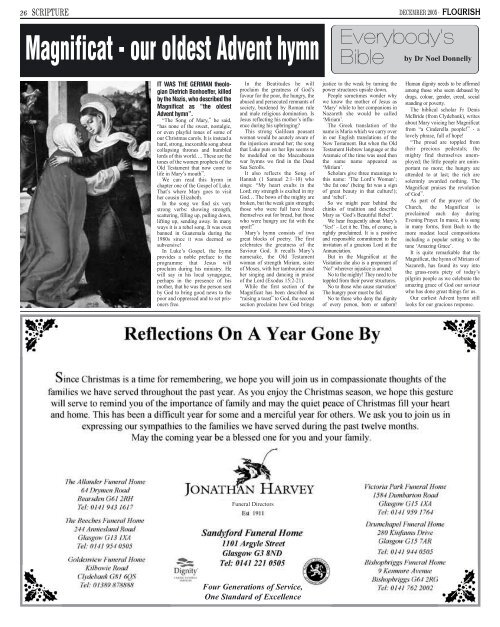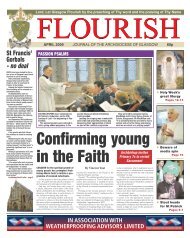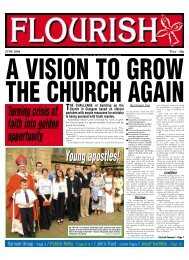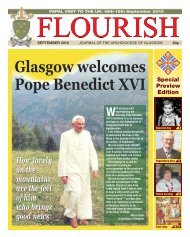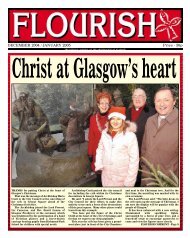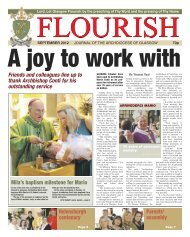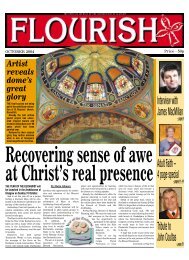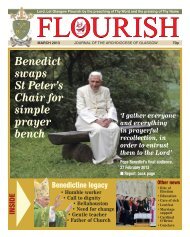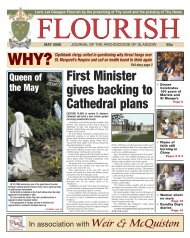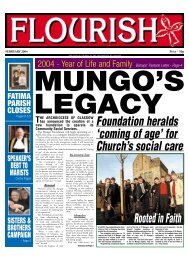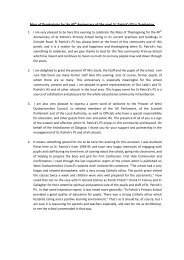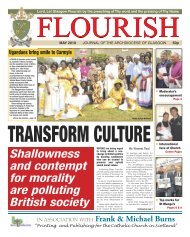26 SCRIPTUREDECEMBER <strong>2005</strong> ·Magnificat - our oldest Advent hymnEverybody’sBibleby Dr Noel DonnellyIT WAS THE GERMAN theologianDietrich Bonhoeffer, killedby the Nazis, who described theMagnificat as “the oldestAdvent hymn”.“The Song <strong>of</strong> Mary,” he said,“has none <strong>of</strong> the sweet, nostalgic,or even playful tones <strong>of</strong> some <strong>of</strong>our Christmas carols. It is instead ahard, strong, inexorable song aboutcollapsing thrones and humbledlords <strong>of</strong> this world…. These are thetones <strong>of</strong> the women prophets <strong>of</strong> theOld Testament that now come tolife in Mary’s mouth”.We can read this hymn inchapter one <strong>of</strong> the Gospel <strong>of</strong> Luke.That’s where Mary goes to visither cousin Elizabeth.In the song we find six verystrong verbs: showing strength,scattering, filling up, pulling down,lifting up, sending away. In manyways it is a rebel song. It was evenbanned in Guatemala during the1980s since it was deemed sosubversive!In Luke’s Gospel, the hymnprovides a noble preface to theprogramme that Jesus willproclaim during his ministry. Hewill say in his local synagogue,perhaps in the presence <strong>of</strong> hismother, that he was the person sentby God to bring good news to thepoor and oppressed and to set prisonersfree.In the Beatitudes he willproclaim the greatness <strong>of</strong> God’sfavour for the poor, the hungry, theabused and persecuted remnants <strong>of</strong>society, burdened by Roman ruleand male religious domination. IsJesus reflecting his mother’s influenceduring his upbringing?This strong Galilean peasantwoman would be acutely aware <strong>of</strong>the injustices around her; the songthat Luke puts on her lips seems tobe modelled on the Maccabeeanwar hymns we find in the DeadSea Scrolls.It also reflects the Song <strong>of</strong>Hannah (1 Samuel 2:1–10) whosings: “My heart exults in theLord; my strength is exalted in myGod… The bows <strong>of</strong> the mighty arebroken, but the weak gain strength;those who were full have hiredthemselves out for bread, but thosewho were hungry are fat with thespoil!”Mary’s hymn consists <strong>of</strong> twogreat blocks <strong>of</strong> poetry. The firstcelebrates the greatness <strong>of</strong> theSaviour God. It recalls Mary’snamesake, the Old Testamentwoman <strong>of</strong> strength Miriam, sister<strong>of</strong> Moses, with her tambourine andher singing and dancing in praise<strong>of</strong> the Lord (Exodus 15:2-21).While the first section <strong>of</strong> theMagnificat has been described as“raising a toast” to God, the secondsection proclaims how God bringsjustice to the weak by turning thepower structures upside down.People sometimes wonder whywe know the mother <strong>of</strong> Jesus as‘Mary’ while to her companions inNazareth she would be called‘Miriam’.The Greek translation <strong>of</strong> thename is Maria which we carry overin our English translations <strong>of</strong> theNew Testament. But when the OldTestament Hebrew language or theAramaic <strong>of</strong> the time was used thenthe same name appeared as‘Miriam’.Scholars give three meanings tothis name: ‘The Lord’s Woman’;‘the fat one’ (being fat was a sign<strong>of</strong> great beauty in that culture!);and ‘rebel’.So we might peer behind thechinks <strong>of</strong> tradition and describeMary as ‘God’s Beautiful Rebel’.We hear frequently about Mary’s‘Yes!’ – Let it be. This, <strong>of</strong> course, isrightly proclaimed. It is a positiveand responsible commitment to theinvitation <strong>of</strong> a gracious Lord at theAnnunciation.But in the Magnificat at theVisitation she also is a proponent <strong>of</strong>‘No!’ wherever injustice is around:No to the mighty! They need to betoppled from their power structures.No to those who cause starvation!The hungry poor must be fed.No to those who deny the dignity<strong>of</strong> every person, born or unborn!Human dignity needs to be affirmedamong those who seem debased bydrugs, colour, gender, creed, socialstanding or poverty.The biblical scholar Fr DenisMcBride (from Clydebank), writesabout Mary voicing her Magnificatfrom “a Cinderella people!” - alovely phrase, full <strong>of</strong> hope!“The proud are toppled fromtheir precious pedestals; themighty find themselves unemployed;the little people are unimportantno more; the hungry areattended to at last; the rich aresolemnly awarded nothing. TheMagnificat praises the revolution<strong>of</strong> God”.As part <strong>of</strong> the prayer <strong>of</strong> theChurch, the Magnificat isproclaimed each day duringEvening Prayer. In music, it is sungin many forms, from Bach to themore modest local compositionsincluding a popular setting to thetune ‘Amazing Grace’.It is quite remarkable that theMagnificat, the hymn <strong>of</strong> Miriam <strong>of</strong>Nazareth, has found its way intothe grass-roots piety <strong>of</strong> today’spilgrim people as we celebrate theamazing grace <strong>of</strong> God our saviourwho has done great things for us.Our earliest Advent hymn stilllooks for our gracious response.Funeral DirectorsFour Generations <strong>of</strong> Service,One Standard <strong>of</strong> Excellence
SCRIPTURE 27· DECEMBER <strong>2005</strong>This is the time to make Christ presentADVENT is about somuch more thanpreparing for Christmas.It is aboutpreparing for Christ.It is about preparing forChrist’s return, and in doing sopreparing for our celebration <strong>of</strong>the first coming <strong>of</strong> Christ.However, there is anotheraspect to Advent, which seems,if anything, to be brought outeven more clearly this year, andthat is the question <strong>of</strong> preparingfor the coming <strong>of</strong> Christ amongus in our present day.Advent is about reflecting in aspecial way on the continuingpresence <strong>of</strong> Christ in our midst.And clearly this idea is one wecan take with us into theChristmas season and beyond.In the liturgy for this season,prophetic voices are important –they dominate the readings, especiallyfrom the book <strong>of</strong> Isaiah.On the 2nd Sunday <strong>of</strong> Advent,we have a reading from the beginning<strong>of</strong> second part Isaiah – datingfrom Israel’s period in exile, afterthe Temple and Jerusalem itselfhad been destroyed.It is a message <strong>of</strong> comfort, orconsolation, for a people whohave lost everything - country,temple, relationship with God,even hope. The first words are <strong>of</strong>comfort - “console my people!”This message is from God as hereveals himself to be close to hispeople in their need.The presence <strong>of</strong> the Lord canbe felt even in exile - in the‘wilderness’. And the people areto begin making preparations t<strong>of</strong>eel the Lord’s closeness rightaway, by moving all obstacles tothe Lord’s path.In the gospel, John the Baptist’sproclamation takes up the theme<strong>of</strong> God’s closeness. John,however, instructs people to finda wilderness in order to experiencethe presence <strong>of</strong> the Lord.In the wilderness it is so mucheasier to be aware <strong>of</strong> God’s presence.There are fewer distractions.Finding our personalwilderness allows us to flattenmountains and fill in the valleyswhich prevent us from comingclose to God.The 3rd Sunday <strong>of</strong> Adventtakes us into the third part <strong>of</strong>Isaiah, when Israel was back inits own land, after the exile. But,even then, their problems hadnot all been solved. Prophetsstill had their part to playreminding the people <strong>of</strong> theirneed for God, and <strong>of</strong> the nearness<strong>of</strong> God to them.Here, the prophet himselfmakes evident the presence <strong>of</strong>God, because the spirit <strong>of</strong> theLord is upon him. He has beensent to bring good news to thepoor, to bind up broken heartsand set prisoners free. These arethe very words that Jesus laterused to announce his ownministry in the synagogue atNazareth (Luke 4:14 – 21).Like John the Baptist, theprophet has the task <strong>of</strong> makingclear the presence <strong>of</strong> the Lord inthe midst <strong>of</strong> the people – and notjust in the future, but here and now.The final Sunday <strong>of</strong> Adventhas much more to do with thebuild up to the birth <strong>of</strong> Christ,and the prophecy is about thesuccessor <strong>of</strong> David. God willdwell among his people.Once again, while looking tothe future, the prophecy has apresent reality. Only those with asense <strong>of</strong> God’s presence canlook forward with any meaningto his dwelling among them.In Hebrew, the word ‘to speak’is also the word ‘to do’. So, tospeak is to make happen; theword is already being fulfilled -“this prophecy is being fulfilledeven as you listen”).What the angel Gabriel says toMary as the Word <strong>of</strong> God, iswhat Mary says: “Let it be doneas you have said.”So all through Advent, sincethe prophets speak God’s word,and since when God speaks, hisword already happens, we arebrought closely into the eternalpresence <strong>of</strong> God among us.This word comes to fulfilmentin Christmas. Now God’s Word<strong>of</strong> consolation becomes God’saction on behalf <strong>of</strong> his people.Jesus, the Word <strong>of</strong> God madeflesh, is God’s ultimate answer tohis people’s cry in their distress.God gives himself in humanform to respond to our distress –whatever that might be.SECOND SUNDAY OFADVENTIsaiah 40:1-5,9-112 Peter 3:8-14Mark 1:1-8THE CENTRAL FIGURE intoday's readings is John theBaptist. And the overall themeis the announcement and preparationfor the coming <strong>of</strong> theLord.The Gospel is the opening <strong>of</strong>the gospel according to Mark.He sets the theme for his gospelin his opening sentence: "Thebeginning <strong>of</strong> the Good Newsabout Jesus Christ, the Son <strong>of</strong>God." This is the story he wantsto tell, or rather, the good newshe wants to proclaim.Mark's presentation is one <strong>of</strong>a gradually unfolding identity <strong>of</strong>the man Jesus. It reaches itsclimax and completion when --not, surprisingly, a disciple --but a pagan soldier at the foot <strong>of</strong>the cross says in awe: "Trulythis man was Son <strong>of</strong> God!"We read these texts in thecontext <strong>of</strong> preparing for Christmasand the coming <strong>of</strong> the Lord intoour own lives. This is a time forFOURTH SUNDAY OFADVENT2 Samuel 7:1-5,8-11,16Romans 16:25-27Luke 1:26-38WE ARE COMING veryclose now to our celebration <strong>of</strong>Christmas. And today weconsider the key role <strong>of</strong> Mary inthe work <strong>of</strong> our salvation. Mary,we might say, made Christmaspossible.How many times have wesaid 'No' to God? How differentwould things be -- for us and forothers -- if we had said 'Yes' tohim more <strong>of</strong>ten? Mary isdescribed as "full <strong>of</strong> grace",filled with God's favour andgraciousness. On the other hand,Mary exercises her inviolableright to freedom <strong>of</strong> choice. Arequest was made <strong>of</strong> her and shefreely responds with a wholehearted'Yes'. Mary's 'Yes'changed the world. Her obedienceto God's call changed thelives <strong>of</strong> all <strong>of</strong> us -- believers orreflection and personal renewalabout the coming <strong>of</strong> Jesus into mylife, into the life <strong>of</strong> our Christiancommunities and into our widersociety.John the Baptist reminds us thatwe, too, have a responsibility toproclaim the Good News <strong>of</strong> thecoming <strong>of</strong> Jesus and to helppeople know and love him andexperience his love in their livesjust as other people have broughtus to where we are.It is not easy in our society t<strong>of</strong>ind Jesus and to accept hisvalues and vision <strong>of</strong> life. Peopleneed people who can help"make a straight highway forGod" to enter their lives.We have a responsibility asChristians to bring the GoodNews <strong>of</strong> God's love to others.We need to present a messagethat is full <strong>of</strong> joy, a joy that isclearly mirrored in our ownbehaviour, because it flows outfrom an inner core <strong>of</strong> wisdomand peace.not -- one way or another.The world associates obediencewith weakness and spinelessness.True obedience comesfrom a free choice made in thelight <strong>of</strong> what is true and good.True obedience can require agreat deal <strong>of</strong> courage because itcan involve going against thetide <strong>of</strong> social expectations.True obedience aims not atsafely conforming to the expectations<strong>of</strong> those more powerfulthan ourselves but <strong>of</strong> puttingoneself at the service <strong>of</strong> somethingthat is greater thanoneself.Christmas is a time for us torenew our 'Yes' to Jesus and toall that he calls us to be andbecome.It is by saying a wholeheartedand totally unconditional 'Yes' toJesus that he will be re-born inme or maybe even born in mefor the first time. By my saying'Yes', through me he will beborn or re-born in others too.THIRD SUNDAY OFADVENTIsaiah 61:1-2,10-111 Thess 5:16-24John 1:6-8,19-28ON THIS SUNDAY thetheme is traditionally one <strong>of</strong> joy.The first word <strong>of</strong> the entrancehymn today is "Rejoice!"And why should we berejoicing? Because we are soonto remember that the Son <strong>of</strong> God,Jesus the Christ, came to liveamong us as a human being andbe one <strong>of</strong> us. We rejoice becausehe brings such good news.Jesus clearly identifieshimself with the anointed kingwho is the Messiah and Saviour<strong>of</strong> God's people - sent me tobring good news to the poor, tobind up hearts that are broken;SundayScripturesCHRISTMAS MASS,MIDNIGHTIsaiah 9:1-6 Titus 2:11-14Luke 2:1-14CHRISTMAS IS A FEAST <strong>of</strong>light, joy and liberation. Thereadings resonate with the theme<strong>of</strong> light and the baby in themanger is the Light <strong>of</strong> theWorld. Light surrounds the shepherdsas the angels sing theirpraises <strong>of</strong> God: "Glory to God inthe highest and, on earth, peaceto all who are favoured by God."The whole atmosphere is alsosuffused with joy, the joy <strong>of</strong> theangels and <strong>of</strong> the shepherds as theyhasten to Bethlehem to find thenew-born child. Joy is a themewhich goes right through Luke'sgospel. It is one <strong>of</strong> the characteristics<strong>of</strong> the true Christian.Another cause for joy is theliberation that Jesus brings. Thisis shown by the way in which hecomes. He is, after all, the King<strong>of</strong> Kings and the Prince <strong>of</strong>Peace.to proclaim liberty to captives…Even for those <strong>of</strong> us who livein islands <strong>of</strong> abundance andfreedom, there are forms <strong>of</strong>poverty - social, emotional,intellectual, spiritual – andforms <strong>of</strong> captivity - compulsions,obsessions, addictions.For the true Christian, happinessis the underlying experience<strong>of</strong> daily living, even if, now andthen, there are painful problemsto be deal with. A key to ourenduring happiness is an unconditionalopenness to where Godleads us and a readiness to speakout and act boldly in his name.Like John the Baptist, we tooare witnesses for the light. ThisChristmas, how many will experienceJesus being reborn withinthem through our witnessing?by CanonRobert HillWhere then are the trappings <strong>of</strong>majesty and power? Where is thepalace, where are the courtiers,where are the honour guards? Hecomes not to exert power but togive power especially to the poorand the weak.Thomas Merton, Trappist monkand writer, has expressed it thisway: "Into this world, thisdemented inn, in which there isabsolutely no room for him at all,Christ has come uninvited. Butbecause he cannot be at home init, because he is out <strong>of</strong> place in it,and yet he must be in it, his placeis with those others for whomthere is no room."His place is with those whodo not belong, who are rejectedby power because they areregarded as weak, those who arediscredited, who are denied thestatus <strong>of</strong> persons, tortured,excommunicated. With those forwhom there is no room, Christ ispresent in this world."Frank J. Lynch LtdFuneral Directors323 Dumbarton Road, Partick, <strong>Glasgow</strong> G11 6ALTelephone 0141 339 1122We are one <strong>of</strong> <strong>Glasgow</strong>’s few independent family ownedcompanies, <strong>of</strong>fering traditional funerals at a modest price.Funerals conducted to all parts <strong>of</strong> the world.A company you can trust to carry outloved ones wishes for burial or cremation.The only independent family companyin Partick and Possilpark.Also at136 Balmore Road, Possilpark, <strong>Glasgow</strong> G22 6LJTel: 0141 336 2300Pre-Payment Plans availableJ. G. Murren & SonsLasting impressions are our first priorityA funeral servicerepresents a family’sfinal farewell totheir loved one.Knowing this, we gobeyond what is expected toensure that the ceremony isbeautiful and memorable…a truly fitting tribute to that special life.We think you’ll be pleased to findthat making last impressionsis our first priority.FUNERAL DIRECTORS20 Quarry Street, Johnstone PA5 8DZ(Opposite Johnstone Police Station)TEL: 01505 382929AT ANY HOURF U N E R A L D I R E C T O R SIndependent Family BusinessEstablished over 70 YearsOffering Care, Dignityand Personal Attention996 Govan Road, <strong>Glasgow</strong> G51 3DU


